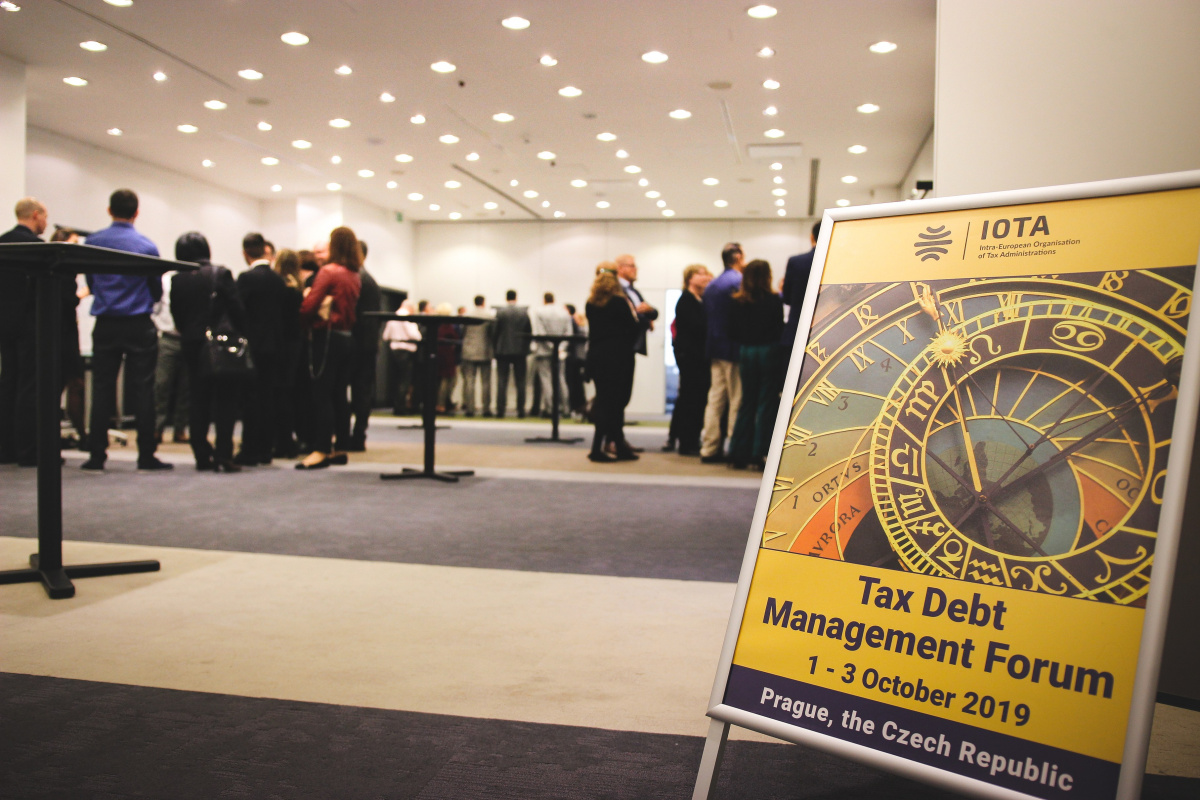The data-driven debt collection and recovery was the main theme of the first meeting of the IOTA Forum on Tax Debt Management hosted by the Financial Administration of the Czech Republic in Prague on 1-3 October 2019.
60 delegates from 31 countries along with the representative from the European Commission’s Directorate General of Tax and Customs Union (DG TAXUD) came together to discuss the innovative techniques and best practices of using data from national and international sources in order to improve the management of tax debts.

In his opening remarks, Mr Jan Ronovský, Deputy Director General of the Financial Administration of the Czech Republic, congratulated IOTA on the establishment of such Forum helping member tax administrations to explore new possibilities of mutual cooperation in the area of tax debt management.
At the introductory session, IOTA Secretariat presented draft Mandate of the Forum covering six priority areas and several projects on which the activities of the Forum will focus during the period 2020-2021.
The plenary sessions of the Forum included the impressive success stories on data-driven approaches to the management of tax debts, presented by the Czech Republic (monitoring of arrears recovery, electronic auctions, use of data warehousing), Ireland (big data in debt management), Italy (choosing the debt collection and recovery intervention on the basis of available data), Portugal (electronic seizure system), Russian Federation (automation of debt collection procedures and mechanisms) and the United Kingdom (data analytics for the next generation debt management).
One of many highlights of the IOTA Forum meeting in Prague was series of presentations by the Belgian delegates on the way the results of datamining support their debt recovery strategy.
Another highlight of the event was two parallel sessions offering the presentations from Spain (risk analysis in Spanish tax collection), Ireland (Agent Declaration Form - streamlining risk-based approach to debt payment arrangements), the Netherlands (dynamic monitoring of debt/debtors) and Belgium (enforcing debt recovery on the basis of datamining results) that enriched the attendee's knowledge about the use of data in risk-based approaches of debt collection and recovery.

“Ask your peer for advice: learning and sharing”
During the Forum meeting, a networking space “Ask your peer for advice: learning and sharing” was organised allowing delegates to interact and raise the most challenging/problematic areas of debt management work in terms of use of data which they would like to learn from each other through a peer-to-peer collaboration.
Group discussion sessions at the Forum provided an excellent setting to share the knowledge and practices of the participating tax administrations concerning the effective and efficient use of data from third parties that support the debt collection process, and to consider ways of improving the segmentation of debts and debtors with support of data obtained from national and international sources.
In the subsequent discussion, delegates explored the possibility of using data from the automatic exchange of information for the effective debt management. Norway had given a presentation about the ongoing national project analysing Common Reporting Standard (CRS) data, highlighting the key lessons learned so far, particularly the importance to research and validate the legal aspects (Tax Treaties, Bi-/multilateral agreements, OECD/EU) of using international data in individual cases and through automatic processes, and to clarify do’s and don’t regarding using and sharing information internally in the Norwegian Tax Administration, etc (GDPR).
European Commission’s DG TAXUD provided a brief update on the work carried out at the EU level in the field of debt recovery. Belgium presented the activities of OECD FTA Tax Debt Management Network for 2019-2020.
IOTA Secretariat together with Sweden, as a sponsor of IOTA project “Knowledge database on cross-border insolvency proceedings”, presented a brief outline of what they had done so far with the gathering of information through the country surveys from almost 30 countries as well as the next steps in terms of future work, particularly in designing architecture of the knowledge database, integrating collected data, developing data visualisation, etc.
 Furthermore, IOTA Secretariat informed the delegates about the launch of the IOTA framework for cross-border nudging of tax debtors and invited the participating tax administrations to join the subgroup for defining process and methodology as well as planning of the first pilot project based on the results of the pre-project survey. Also, Belgium and the Netherlands presented the concept of the bilateral cooperation project aiming at the use of nudging techniques to communicate with debtors (natural persons) living in one country and having tax debts in the other country.
Furthermore, IOTA Secretariat informed the delegates about the launch of the IOTA framework for cross-border nudging of tax debtors and invited the participating tax administrations to join the subgroup for defining process and methodology as well as planning of the first pilot project based on the results of the pre-project survey. Also, Belgium and the Netherlands presented the concept of the bilateral cooperation project aiming at the use of nudging techniques to communicate with debtors (natural persons) living in one country and having tax debts in the other country.
All in all, the Forum offered a great variety of numerous sessions, delivering first-hand experiences, group discussions as well as interactive peer-to-peer sessions. The very positive feedback from all parties proved the need for a dedicated platform for senior debt collection/recovery experts to identify, develop and disseminate good working practices in the area of tax debt management. The IOTA Forum will undertake further work, which was successfully carried out by the former Area Group on Debt Management (2012-2018), in relation to the practical application of working methods and tools developed to effectively manage tax debts.
Next meeting of the IOTA Forum on Tax Debt Management will be held on 29 September – 1 October 2020 (venue to be decided) exploring the impact of personal data protection on risk analysis and segmentation of debtors.
More information about the IOTA Forum, including all presentations, is available HERE for registered users.
